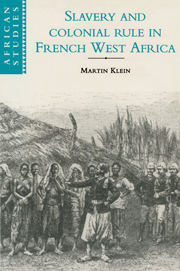Book contents
- Frontmatter
- Contents
- List of illustrations
- List of maps
- List of tables
- Preface
- List of abbreviations
- Glossary
- 1 Slavery in the Western Sudan
- 2 Abolition and retreat. Senegal 1848–1876
- 3 Slavery, slave-trading and social revolution
- 4 Senegal after Brière
- 5 Conquest of the Sudan: Desbordes to Archinard
- 6 Senegal in the 1890s
- 7 The end of the conquest
- 8 The imposition of metropolitan priorities on slavery
- 9 With smoke and mirrors: slavery and the conquest of Guinea
- 10 The Banamba Exodus
- 11 French fears and the limits to an emancipation policy
- 12 Looking for the tracks. How they did it
- 13 After the War: renegotiating social relations
- 14 A question of honor
- Appendixes
- Notes
- Bibliography
- Index
- Titles in the series
9 - With smoke and mirrors: slavery and the conquest of Guinea
Published online by Cambridge University Press: 07 May 2010
- Frontmatter
- Contents
- List of illustrations
- List of maps
- List of tables
- Preface
- List of abbreviations
- Glossary
- 1 Slavery in the Western Sudan
- 2 Abolition and retreat. Senegal 1848–1876
- 3 Slavery, slave-trading and social revolution
- 4 Senegal after Brière
- 5 Conquest of the Sudan: Desbordes to Archinard
- 6 Senegal in the 1890s
- 7 The end of the conquest
- 8 The imposition of metropolitan priorities on slavery
- 9 With smoke and mirrors: slavery and the conquest of Guinea
- 10 The Banamba Exodus
- 11 French fears and the limits to an emancipation policy
- 12 Looking for the tracks. How they did it
- 13 After the War: renegotiating social relations
- 14 A question of honor
- Appendixes
- Notes
- Bibliography
- Index
- Titles in the series
Summary
… poorly nourished, poorly treated and poorly paid for their work, slaves husband their resources as long as they can and work only as long as their masters are there to watch. Thus the latter are forced to stay nearby, seated under a tree reading several pages from their Qurans or chatting with several followers… The Fula is poorly endowed by nature for physical labor, puny and sickly… with no resource other than cultivation by his slaves…
Among Malinke there is no visible difference between master and slave, no disdain of the one for the other, no rancour, they eat the same food and work side by side … flight and misery will soon deprive the Fulas of slaves they can no longer renew by war, while the Malinke preserve theirs, linked to them by community of interest, I would even say by appreciation and affection.
Paul Guebhard on Guinean slaveryEven more than in the Sudan, the French in Guinea were on the side of the slave owners. There were a number of reasons for this. Most important, France put few resources into the conquest and control of Guinea in spite of the importance of rubber exports. Only the Sudanese part of Guinea was actually conquered. Because of this, Guinea had few soldiers and administrators. Furthermore, problems of health and poor administration meant that there was a very high turnover. At one point, Faranah had ten commandants in four years. Ditinn had twelve in nine years.
- Type
- Chapter
- Information
- Slavery and Colonial Rule in French West Africa , pp. 141 - 158Publisher: Cambridge University PressPrint publication year: 1998

